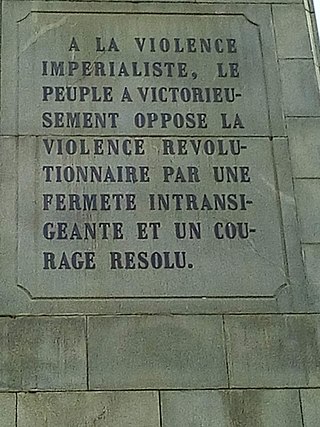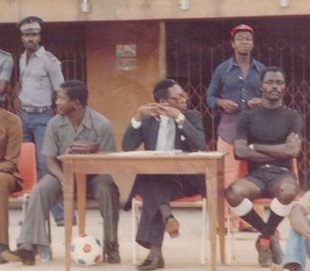Related Research Articles

The foreign relations of Guinea, including those with its West African neighbors, have improved steadily since 1985.

Conakry is the capital and largest city of Guinea. A port city, it serves as the economic, financial and cultural centre of Guinea. Its population as of the 2014 Guinea census was 1,660,973.

Ahmed Sékou Touré was a Guinean political leader and African statesman who became the first president of Guinea, serving from 1958 until his death in 1984. Touré was among the primary Guinean nationalists involved in gaining independence of the country from France. He would later die in the United States in 1984.

Boubacar Diallo Telli was a Guinean diplomat and politician. He helped found the Organisation of African Unity (OAU) and was the second secretary-general of the OAU between 1964 and 1972. After serving as Minister of Justice in Guinea for four years he was executed by starvation by the regime of Ahmed Sékou Touré at Camp Boiro in 1977.
Djibril Tamsir Niane was a Guinean historian, playwright, and short story writer.
Camp Boiro or Camp Mamadou Boiro (1960–1984) is a defunct Guinean concentration camp within Conakry city. During the regime of President Ahmed Sékou Touré, thousands of political opponents were imprisoned at the camp. It has been estimated that almost 5,000 people were executed or died from torture or starvation at the camp. According to other estimates, the number of victims was ten times higher: 50,000.

Morlaye Cissé is a coach and a retired Guinean football defender.
Trade unions in Guinea were historically important - having played a pivotal role in the country's independence movement - and in recent years have again assumed a leading role.

Loffo Camara was a senior Guinean politician and a member of the Politburo of the First Republic of Guinea in the years immediately following independence. After falling out with the President Sékou Touré, she was dismissed from the cabinet, and later was arrested and executed.
Alioune Dramé was a Guinean economist and politician. He also served as an ambassador to Ivory Coast.

Lansana Diané was a general and a minister in the cabinet of Ahmed Sekou Touré, President of Guinea during the First Republic (1958–1984). The military government that took power after Touré's death executed him in 1985.
Alpha Oumar Barry (1925–1977) was a Guinean politician, a member of the cabinet of President Ahmed Sékou Touré in the first Guinean republic, who was later arrested and died at Camp Boiro.

Siaka Touré (1935–1985) was the commandant of Camp Boiro in Conakry, Guinea during the regime of Guinean President Ahmed Sékou Touré. During this period, many of the president's political opponents died in the camp.
Jean-Paul Alata was a Frenchman who was a political prisoner in Camp Boiro, Guinea from January 1971 to July 1975, later writing a book about his experience which was banned by the French government.
The Ignace Deen Hospital is a hospital in Conakry, Guinea built during the colonial era. The hospital is situated next to the National Museum.

The Monument du 22 Novembre 1970 is a monument in Conakry, Guinea that celebrates the defeat of the attempted coup led by Portuguese troops in 1970, named Operation Green Sea.

Mory Sinkoun Kaba, known as Kaba Mory or MS, was a Guinean businessman and philanthropist. Close to president Sékou Touré, he realised numerous state projects on his behalf.

Koumanthio Zeinab Diallo is a Guinean poet, novelist and playwright who writes in both French and Fulani.
Mamadi Camara is a Guinean politician who is currently the Minister of Economy and Finance. He is a member of the Majority Rally of the Guinean People Party of former president Alpha Conde.
References
- ↑ "Sixth General Assembly of States Parties to the Convention concerning the Protection of the World Cultural and Natural Heritage" (PDF). UNESCO. 1987-10-30.
- ↑ Karl-Heinz Erdmann (2013-03-13). Perspectives of Human Action: Environment and Ethics. Springer.
- ↑ "Guinea: Former Minister and Diplomat Lamine Capi Kamara Celebrated and Named "Living Human Treasure of Guinea" by CIRD". Siaminfos. 2024-02-25. Retrieved 2024-02-29.